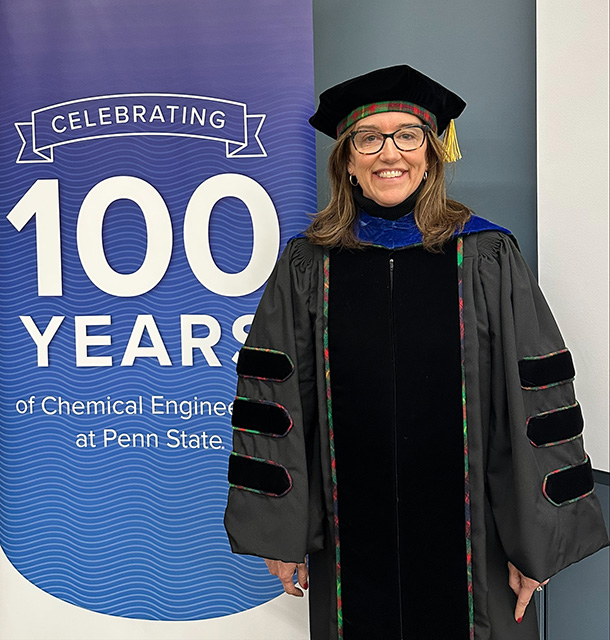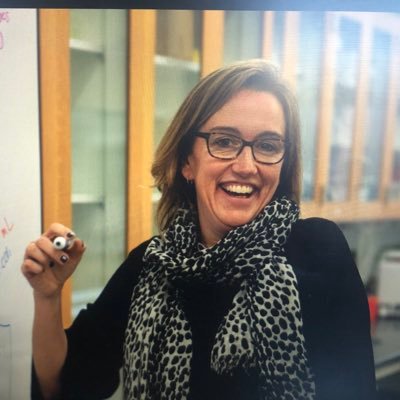Alum spotlight: Stephanie Butler Velegol
Lauren Smith
Jan 31, 2025

Source: Stephanie Butler Velegol
Stephanie Butler Velegol ('00) chose the chemical engineering Ph.D. program at Carnegie Mellon because of its supportive community. That sense of support has stayed with her as an alum and served as a model for creating community through her work.
After a postdoctoral fellowship in environmental engineering at The Pennsylvania State University, Velegol became a visiting professor at Bucknell University. The 80 mile commute from State College, where she remained living with her husband, a professor at Penn State, became unsustainable when they started a family. Velegol made the hard decision to take a break from her career to stay home with her children.
About five years later, Velegol's postdoctoral advisor at Penn State offered her the opportunity to teach a water and wastewater treatment course. She soon fell in love with the topic and became passionate about addressing problems with clean water in the developing world. "I was teaching students in the US how to treat water to prevent illness and death, yet people were dying elsewhere in the world. We have the answers. The barrier is infrastructure," she says.
Velegol heard about a colleague who was researching the Moringa oleifera tree, which grows in equatorial regions of the world. The seeds of the tree contain a cationic, or positively charged, antimicrobial protein. Velegol had done her dissertation on positively charged polymers and surfactants, and she had also done work on proteins with her advisor, Bob Tilton. She had an idea to create a new and sustainable water treatment technique by combining sand and the positively charged proteins from the seeds. Negatively-charged bacteria and viruses would stick to the sand mixture, allowing it to function as a filter. Velegol shared her research with Tilton, and they collaborated on the project.

Source: Stephanie Butler Velegol
Even more than in the lab, Velegol is an innovator in the classroom. She started flipping her classroom in 2010, when the concept was still very new. Her students watched her lecture videos ahead of class, then came to the classroom to do the problems. As she tried different iterations of the approach, Velegol published her findings about what worked best.
She eventually moved to Penn State's chemical engineering department, where she is now associate department head and teaching professor. In that role, she has developed a seminar to ease the transition for chemical engineering students who move to University Park campus from one of Penn State's other commonwealth campuses.
Velegol also started a graduation ceremony in the department, modeled after her experience at Carnegie Mellon. "We now have a ceremony every semester, and I think it helps students feel like they are part of something," she says.
One of her latest teaching endeavors is Science, Humanity, and Catastrophe, a course she co-created. "We already think a lot about how science has influenced society, in terms of discoveries that have changed lives. In this class, we explore how society has influenced the discovery of science," says Velegol. "What was it about society and cultural events that influenced what people decided to research, how they could research it, and even who was allowed to do the research?"
Velegol's calling to teach was inspired by her mother, who is an educator. "It is exciting to be part of a student's journey as their mind transforms. Especially in chemical engineering, their mind morphs as they learn systems approach thinking," she says.
It is exciting to be part of a student’s journey. Their mind morphs as they learn systems approach thinking.
Stephanie Butler Velegol, Associate Department Head and Teaching Professor, Chemical Engineering, The Pennsylvania State University
In October 2024, Velegol received the Award for Excellence in Chemical Engineering Teaching Practice from the American Institute of Chemical Engineers (AIChE) Education Division. The citation for her award reads: "For fostering student success and belonging through innovative teaching strategies and creating inclusive experiences for both students and faculty."
Velegol views the award as a gift to her younger self. When she decided to step away from her profession, she knew that might mean she would never be recognized with faculty awards. "There are so many pathways. I hope mine serves as an example that you can take a break. You can come back later in life, into a different community, and have an impact," she says.
Velegol's involvement with the AIChE Education Division started during the COVID-19 pandemic. She helped to facilitate a group of instructors who came together to share experiences and ideas about remote teaching.
As a director in the AIChE Education Division, Velegol continues to create a community for her fellow non-tenure-track faculty. She has published research in the space and currently leads a group of 150 teaching-track chemical engineering faculty from across the country.
Velegol says that training students how to think is among the most important things that chemical engineering departments teach. "You're not only training people who are going to build chemical plants. You're also training people who, as lawyers, doctors, consultants, and more, are going to use systems thinking for all kinds of things in the world."
